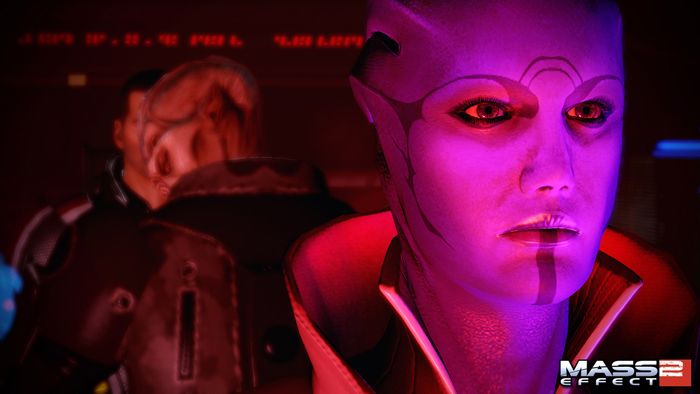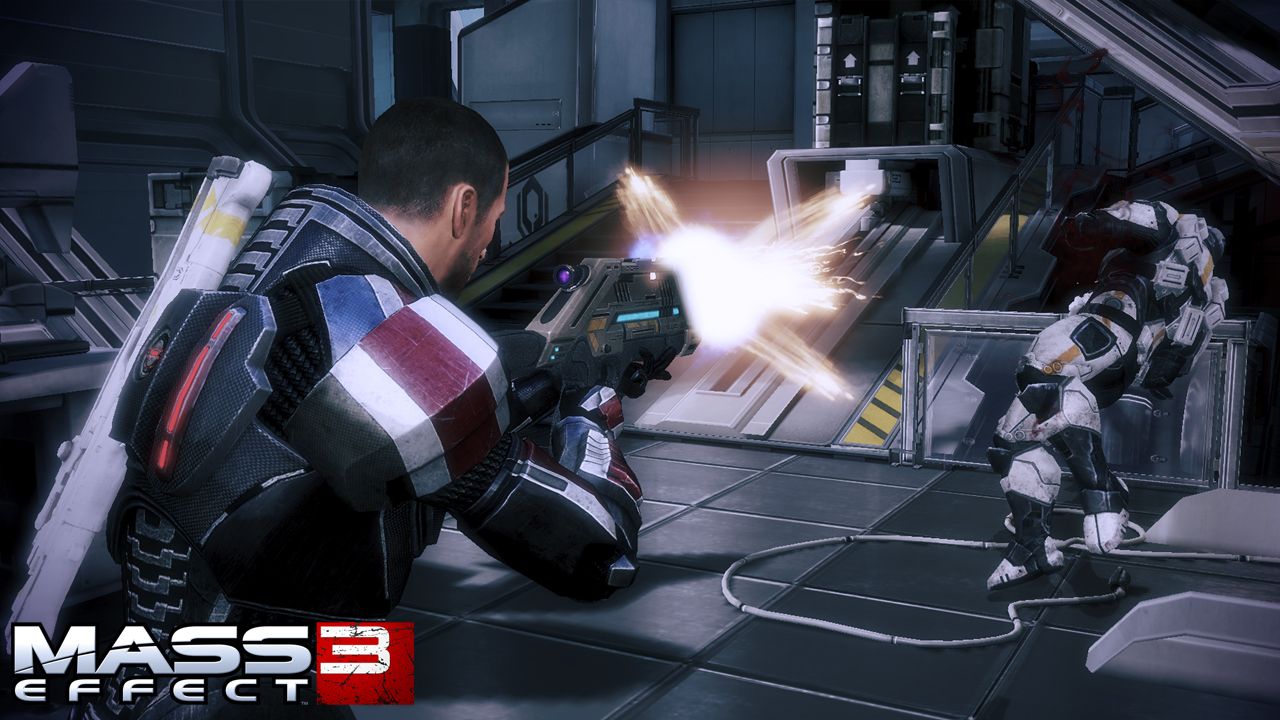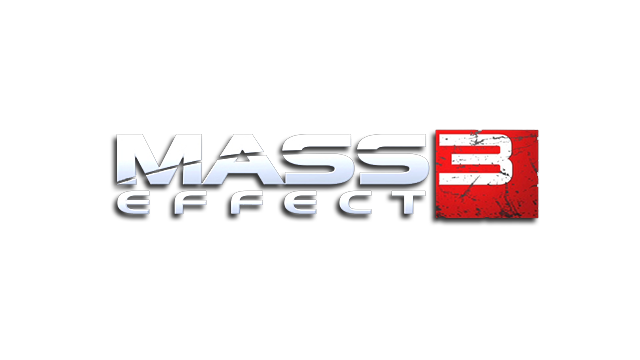One of the best parts about any convention is the sheer amount of awesome people there. At NYCC 2010, I was able to sit in a panel run by Dark Horse, Obsidian and BioWare with regards to comics and their connections to games. It was later on Sunday, the last day of a convention, and it did not specifically reference Mass Effect or Fallout: New Vegas, the two games which had comic tie-ins. I was one of about 20 people in the room with the panelists which included Mac Walters, the Lead Writer of Mass Effect 2 and 3.
This year things were a bit different, with Mass Effect 3 on the horizon and a third volume of the Mass Effect comic book series, we were able to get some time to talk to Walters about the games, the series, the comics and more.
DualShockers: First off Mac, we wanted to congratulate you on becoming a New York Times bestselling author upon having the Mass Effect: Evolution comic series promoted onto their bestsellers list. How exciting is this for you?
Mac Walters: It was unexpected, but very exciting. It was very cool to see.
DS: We’re happy to see this as well, now, the next series stars [the “head” of the asteroid Omega in the Mass Effect series] Aria T’Loak.
MW: That is correct, it comes out October 19th, unless you’re lucky enough to get one here at NYCC. It’s called Invasion and it stars Aria T’Loak, and features Cerberus, including the Illusive Man, and a new character from Cerberus, a general and will be a prelude to Mass Effect 3 itself. It takes place just days before the start of Mass Effect 3.
DS: Excellent. Now, I was at last year’s Mass Effect panel with you, and, well, let’s just say it was a much smaller panel. How much more exciting was it to see that this year’s panel was packed full of screaming Mass Effect fans?
MW: With each successive con, the Mass Effect fans have really shown up, just like in San Diego earlier this year. It was just incredible, where we packed a panel room. That one was sort of multi-discipline, as there were people from The Old Republic there. This was the first truly Mass Effect only panel. At least as advertised. Of course we had a surprise visit from Dragon Age, but people did not know that and to find out that they capped the line almost an hour before, it was just incredible.
DS: Speaking of the panel and the comics, how hard was it to transition from the games to the comics? It seems like the transition from games to movies never really works, but the transition from games to comics seems to not only have gone really smoothly for Mass Effect, but has also actually turned out to be very unique and interesting, as they then tie back into the games, such as with the Shadow Broker DLC. What are the various challenges there?
MW: Well, I think you alluded to some of the successes, as we wanted to make sure that it was tied back into the games. Dark Horse right at the beginning said ‘we want someone like Mac writing this’ so it isn’t just some random person writing about Mass Effect. Instead it is actually one of the creators saying ‘this is a Mass Effect comic, built from the foundations of the Mass Effect universe.’ The challenges really come from my own inexperience in writing comics. Now that I am on my third, I’ve started to get my feet under me, but the first ones were obviously a bit of a challenge, and Dark Horse luckily had faith and a bit of patience with me and in the end it worked out great.

DS: I’ll say, now what was the decision like to pick which character to choose for the comics? You’ve done the Illusive Man, who is one of the more intriguing and core characters of the series, you’ve done Liara, who is another core character to the series and now you have Aria, who was, while not necessarily a major character, though she was clearly a major player, but we didn’t see quite as much of her as we did with the previous two. What was the decision like to choose to bring her into a larger part of the story?
MW: Honestly a lot of it just comes down to interest. Mainly who am I interested in writing a comic about. Aria was one that I had previously done an eight-page comic about a while back and thought ‘that was awesome, but we should do something bigger for her.’ We also take into account the time when the comic is going to come out and the story of that person, given that, well, for instance, when Evolution came out, it was really in between the release of Mass Effect 2 and 3. We figured that was a good time in the real world, not in the Mass Effect timeline, to go back in time and take something that is not necessarily within the timeframe of the game and tie it in in order to give more details and backstory on a character, and who better to give some more information on than the Illusive Man, who we know so little about. So that was part of why we tried that. With Aria, we knew she was going to have a bigger role in Mass Effect 3, so that’s why we went with her.
DS: That is exciting to hear, especially considering how interesting it was when we saw just where the “striking blue eyes” of the Illusive Man came from. It is also something we’re looking forward too, because we hear how powerful Aria is throughout our time on Omega, but we never get to see it, so it is exciting to see her actually get involved and see just why she is so feared as a crime lord. Now, you mentioned that your interest helps drive who you pick for these comics, so who are your favorite characters to write?
MW: Well one of them, no surprise, is the Illusive Man. I do love writing Aria obviously, as well. I’m not writing her as much in Mass Effect 3, but as lead writer, I do get to oversee everything. I really enjoyed writing Garrus in Mass Effect 1, again, because with Garrus and the Illusive Man, and even with Aria, the three of them are all a bit morally ambiguous. Take Garrus, sure he is a C-Sec officer, so you’d think ‘sure he’s a cop, he must be a good guy.’ But as you saw in 2, he goes off and becomes an avenging archangel-vigilante. He wants to do the right thing, but he’s not always sure how far to go to do it. Then we have someone like Aria, who is about as badass as can be and is like the queen super-villain head of Omega, and yet when you talk to her, there is more to her, she is more complex than that. Aside from characters who are morally ambiguous, I like flexible characters and characters that aren’t two dimensional.
DS: Another question regarding the characters; how is it moving characters from [Drew Karpyshyn’s] books into the games? We’ve seen David Anderson, but what about people like Kahlee Sanders or the Cerberus assassin, Kai Leng? We’ve heard that at least Kai will appear in the game, so how hard is it to bring characters from a traditional novel into your own and your team’s writing?
MW: It’s not difficult at all actually. Drew was the lead on the first game and as such he is very familiar with the IP and he writes with those things in mind. So the process of bringing something from the book is not a terribly different process from creating characters for the game, where we will often create the character, create their backstory and try to have a lot of information on the characters. While it is not a whole novel per-se, there is a wealth of information there. It is a very similar process. There was a very similar process to Feron, where he appeared in the Mass Effect: Redemption comics, and then we brought him to life in the Lair of the Shadow Broker DLC.

DS: So now that the proverbial ‘varren’ is out of the bag, how hard was it to incorporate the co-op into the core story? From what we’re hearing from BioWare is reassurance that the co-op is not tacked on, but also not necessary and can have an active effect on the single player story. While it won’t be Shepard’s story, it can still have effects. How hard was it to write for what is essentially a new kind of multiplayer that we haven’t really seen before?
MW: Well I think that we had a plan for single player, and that plan went straight ahead. The idea was similar to what happens when a great idea for a new level comes along later on and you have to decide where you want to fit it. You look at it and say ‘that is a great idea for a level, where do we put it and how can it affect the story?’ It was the same thing for multiplayer. Now that we know how the gameplay is fleshed out, we realized ‘this is how it is going to work out, and this is how it is going to fit into the game.’ It was actually rather seamless in the end. We’re talking about a galaxy that is at war, where everyone is fighting, so it is no stretch that somewhere else you’re going to find people who aren’t Shepard who are fighting. We figured why not let people jump in on that with their friends.
DS: Well we look forward to seeing it in action, especially after hearing so much about it. It is really ambitious, and it is cool to see it incorporated into the story, rather than tacked onto as a separate thing. One final question though, when writing Shepard, do you think of the character as male or female?
MW: I change. I actually switch back and forth all the time. If I’m just writing a scene, I try to think how both Shepards would react to the situation. In general, Shepard is Shepard, male or female. There are obviously going to be some differences, where they’re going to interact with some situations differently and I try to account for that. Of course, there are also times where I’m writing situations for only male Shepard and times when I’m writing for only female Shepard. So I actually have to be dual brained about it, and go back and forth.
DS: Thank you very much and we’re really looking forward to reading Mass Effect: Invasion and playing Mass Effect 3.

